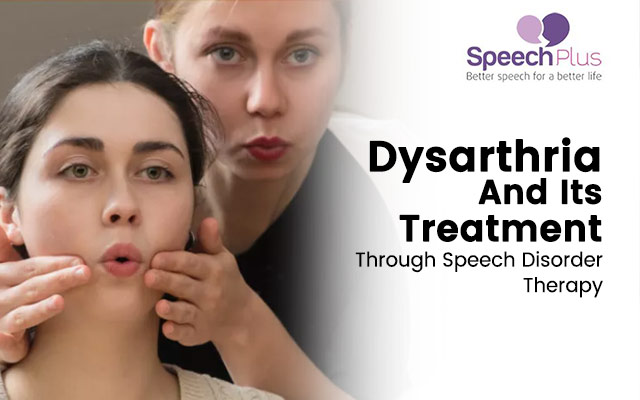Speech disorders like dysarthria happen due to muscle weakness resulting from damage to the nervous system. In dysarthria, the muscles we use to speak become damaged, paralyzed, and weak making it difficult for the person to form or pronounce words.
Just like other speech disorders, dysarthria can also be treated by speech disorder therapy. But let’s understand dysarthria first.
What can cause dysarthria?
When we talk, we use different throat, lips, and face muscles. Weak muscles make it difficult to talk – the same way weak legs make walking troublesome. Dysarthria is caused due to brain damage. It can happen at birth or after an illness or injury including, stroke, brain injury, tumors, Parkinson’s Disease, Amyotrophic lateral sclerosis and more.
How do you recognize dysarthria?
Dysarthria usually occurs with other speech and language disorders. Here are the common symptoms that you can look for.
- Slurred speech
- Too slow or too fast speech
- Mumbling
- Inability to speak louder than a whisper or talking too loud
- Nasal, raspy or strained voice
- Jerky speech pattern
- Uneven speech volume
- Monotone speech
- Difficulty moving your tongue or facial muscles
How speech disorder therapy treats dysarthria?
Dysarthria can be of various types. You might be suffering from apraxia – a type of dysarthria where your brain stops sending messages to your muscles to move. You can also have trouble understanding what others are saying or expressing your own thoughts – also called aphasia.
Hence, it is always advisable to consult speech language pathologists who will determine the type of dysarthria you have and what therapy will work best for your condition.
Your speech disorder therapy might include adjusting your speaking rate, increasing breath support, strengthening muscles, and teaching family members on how to communicate with you effectively. The therapy may also focus on moving your lips and tongue more and practicing clear pronunciation of words and sentences.
Your speech language pathologist may also suggest you to:
- Talk slowly
- Use more breathe to speak louder
- Making your mouth muscles stronger
- Moving your lips and tongue more
- Saying sounds clearly in words and sentences
- Using others ways to communicate like gestures, writing, or using computers.
The inability to communicate properly due to dysarthria can affect your relationships with family and friends and make social situations challenging. It might even lead to social isolation, which can result in depression. So, before things get worse, we recommend you consult a speech therapist and start your journey towards a healthy tomorrow.
